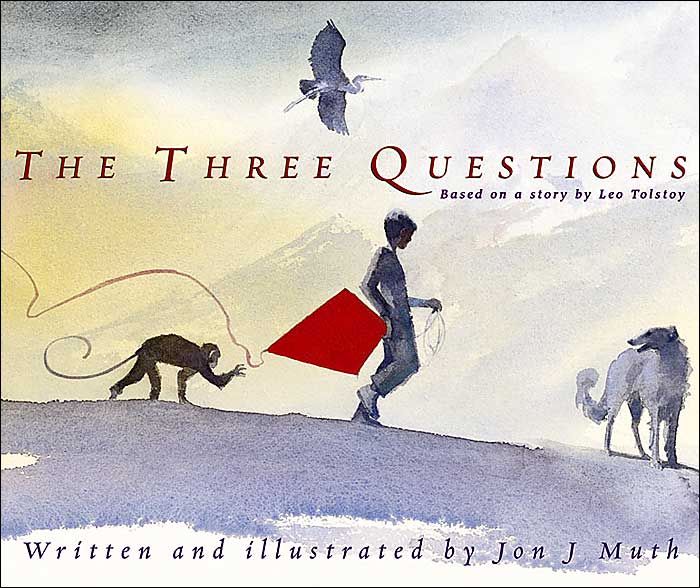 The Three Questions
The Three Questions
by Jon J Muth
Nikolai believes that if he can find the answers to his three questions, he will always know how to be a good person. A heron, a monkey and a dog try to help him, but it does not help Nikolai, so he asks Leo, the wise old turtle. Leo does not answer directly.
Strategies/Skills Used
Reading Strategy 1: Access background knowledge.
Reading Strategy 2: Predict what will be learned or what will happen.
Reading Strategy 5: Make mental pictures.
Reading Strategy 6: Connect what you read with what you already know.
Reading Strategy 9: Identify and interpret literary elements in different genres.
Reading Strategy 10: Summarize what has been read.
Reading Strategy 11: Make inferences and draw conclusions.
Reading Strategy 12: Reflect and respond.
 TEACHING THE ACTIVITY: PRE-READING
TEACHING THE ACTIVITY: PRE-READING
![]() (1) Hand out Jon J Muth Questions and have students respond to the eight questions independently. Collect responses.
(1) Hand out Jon J Muth Questions and have students respond to the eight questions independently. Collect responses.
(2) Ask students to discuss questions in small groups.
(3) Create groups of three or four and ask students to survey an assigned demographic using the Jon J Muth Questions. Suggested survey respondents could be seniors, kindergarten students, health care professionals, educators, parents, peers, and passersby.
(4) Have students share their findings by preparing a presentation for the class that illuminates common themes within their demographic.
(5) Introduce Response Logs/Reflective Journals.
 TEACHING THE ACTIVITY: DURING READING
TEACHING THE ACTIVITY: DURING READING
(6) Split the class into three groups, and have students continue with their Response Logs/Reflective Journals as the three Jon J Muth stories are read aloud. As each story is read, groups should complete the following activities:
- Zen Shorts – Make predictions about what the fable will entail based on the story prelude. (Stopping points should be marked beforehand.)
- Stone Soup – As a group, write a “recipe” indicating what each group member contributes to their community.
- Three Questions – As a group, complete a Sociogram connecting Nikolai (the protagonist) to each of the three animals (crane, monkey and dog).
 TEACHING THE ACTIVITY: POST-READING
TEACHING THE ACTIVITY: POST-READING
(7) Take students out of the classroom to sit outside and do an awareness activity. Ask students to use all five senses and visualize their favourite place in the world.
(8) Lead a discussion about the places students chose to visualize. Ask students, “What did you hear? What did you see? What did you sense?” Ask students if there was anything clouding their visualization. Were they distracted? Why?
(9) Have students discuss the parables in Zen Shorts, and consider solutions that could be applied to their worries or distractions. Assign parable or fable: students should write in the style of the panda’s “Zen philosophy.”
![]() (10) Hand out the Jon J Muth Questions and have students again respond individually.
(10) Hand out the Jon J Muth Questions and have students again respond individually.
(11) Return original responses and have students compare and discuss how their views have (or have not) changed.